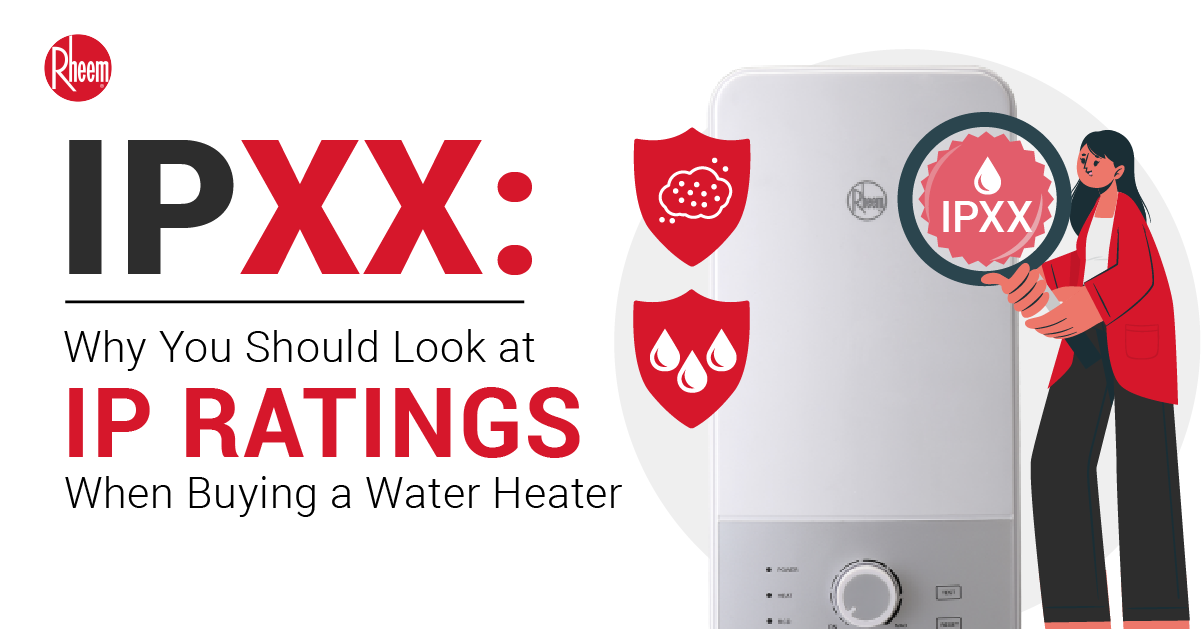
Investing in water heaters has become essential for many Filipino families in the past decade, allowing them to move on from traditional ways of producing warm water. However, one common mistake homeowners make when shopping for water heaters is only buying based on size or design, often not considering safety components while at it. This can do more harm in the long run, leading to extensive unit damage or incidents that risk one’s life.
This is why investing in units with top-notch safety features has become more crucial, especially with more and more families relying on water heaters for their daily warm water needs. This helps ensure that the heater can operate at optimal levels during its lifespan, helping prevent downtime and damage due to various elements.
And one of the most crucial safety-related specifications homeowners should look at when buying a bathroom heater is its Ingress Protection (IP) Ratings. This shows buyers how the unit’s outer casing protects internal components from solid and water particles. But despite its importance, countless people often overlook IP ratings, primarily because of unfamiliarity with the concept, leading to them investing in units that do not fit the requirements of their properties.
As many people already know, combining water and electricity for whatever reason is never a good idea. This is why people must purchase heaters built to resist outside elements that might penetrate the unit. Manufacturers use IP ratings to help people understand how sealed the casing is to protect electrical components from fluids and dust. They are especially crucial on tankless instant water heaters often installed inside bathrooms with high water activity.
The IP rating format is usually at “IPXX,” where the first X represents protection against solid particles, while the second X represents protection against liquids. Learning how to read IP ratings can be a game changer when looking for water heaters, enabling individuals to look for a heater that will satisfy their needs.
Apart from water and other fluids, different solid objects can penetrate a heater and cause damage to it. Human hands and dust particles can cause various mechanical and electrical issues in the unit, such as clogged valves, sensor damage, and corrosion. This can significantly affect a heater’s performance, leading to decreased functionality and a shorter lifespan.
The first digit in the IP rating format represents how protected the heater is against solid objects. This often runs in 7 digits (0-6), each representing the unit’s level of solid object resistance.
0 – An IP rating of 0 means the water heater has no protection against dust or solid object penetration.
1 – An IP Rating of 1 means the mechanical casing can block objects over 50mm, including accidental touch of hands. This helps people avoid contact with live parts of the heater, preventing electrocution. Despite this, dust particles can still enter the unit.
2 – An IP rating of 2 means the heater can block objects larger than 12.5mm in diameter, such as fingers, tools, and insects.
3 – An IP rating of 3 means the casing can prevent the ingress of objects larger than 2.5mm, including wires and small tools. But this still does not give enough protection against dust.
4 – An IP rating of 4 means the heating unit is well-protected against objects larger than 1.0mm. This includes small insects like mosquitoes and flies, as well as nails and thin wires.
5 – An IP rating of 5 provides partial dust protection, only allowing a small amount of dust to penetrate the unit. This won’t significantly affect the heater’s functionality over time.
6 – An IP rating of 6 means the heater is entirely dust-proof, as no dust can penetrate the casing in whatever way.
Installing tankless heaters in bathrooms, kitchens, and laundry rooms provides a strategic spot for families looking to use their heaters in various activities. However, these also pose the risk of moisture from splashes, steam, and condensation penetrating the unit. This can cause electrical damage that might lead to unfortunate incidents. It can also significantly corrode various internal components and decrease the heater’s functionality over time.
To address these issues, looking at the second digit of the IP rating format is vital. The scale for moisture protection in IP ratings comprises 9 digits, each representing the unit’s different water protection levels.
0 – An IP rating of 0 means that the unit is not protected against all types of moisture.
1 – An IP rating of 1 means the heater is protected against vertical drips of water that might come in touch with the unit.
2 – An IP rating of 2 means the heater’s casing can protect internal components from drip intrusion even if the unit is tilted by around 15 degrees.
3 – An IP rating of 3 means protection against direct water sprays, whether shot directly perpendicular to the unit or at least 60 degrees from vertical.
4 – An IP rating of 4 provides enough barrier against water penetration caused by water splashes from all directions.
5 – An IP rating of 5 means the unit has a reliable casing to prevent moisture ingress from low-pressure jets of water, large waves, or spray holes.
6 – An IP rating of 6 means the heater is designed to withstand and avoid water ingress from any water pressure levels, even if the unit is exposed to them for a specific time.
7 – An IP rating of 7 means the water heater is designed to prevent water intrusion from the unit’s electrical components even if submerged in less than 1 meter of water for around 30 minutes.
8 – An IP rating of 8 means waterproof, as submerged in water for a prolonged period would not affect its performance. However, it is worth noting that water heaters with a moisture protection rating of 7 and 8 are not standard for residential applications.
As safety becomes paramount in the modern world, looking at IP ratings can be handy when purchasing water heaters. This scale directly impacts the unit’s safety and durability, so looking for the appropriate rating based on the home environment is crucial. IP ratings can help ensure the safety of the residents when using the heater and guarantee optimal operation in different conditions.
If you are looking for a top-notch water heater to ensure protection against various elements, you should check out Rheem, one of the best water heater brands in the Philippines. With almost 100 years in the water heating industry, we have constantly focused on innovating and creating more advanced, high-quality water heating solutions to suit our customers’ unique needs.
You can browse our extensive range of electric storage water heaters on our website. For any inquiries or more information about our products, you can also talk to one of our representatives at www.rheemphilippines.com/contact.

Subscribe

At Rheem, we strive to innovate
best-in-class products to lead the industry
in
environmental improvements.
Sustainability

